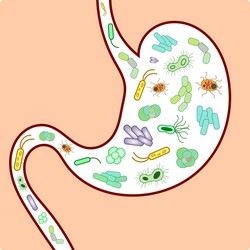Gut microbiota in metabolic disease
The human intestine is colonised by a complex microbial community with up to 1 000 different species. While its composition is specific for each individual, there is a core gut microbiota common among humans. Accumulating evidence indicates that the composition of gut microbiota is altered in individuals who are obese, diabetic or suffer from cardiovascular disease. The intestinal epithelium is the only barrier that separates microbes from human tissue and prevents their translocation. The inner mucous layer is sterile while the outer layer is heavily colonised by bacteria, which utilise mucin glycans as an energy source. The EU-funded MUCUS AND METABOLISM project investigated the interactions between the gut microbiota and the intestinal mucosal barrier in metabolic disease. The work focused on antimicrobial peptides (AMPs) that are secreted as a defence mechanism by epithelial cells against a broad-spectrum of microbes, thereby modulating the composition of gut microbiota. Researchers studied AMP levels in the small intestine as well as gut mucous properties in different mouse models of obesity (diet-induced obesity and genetic obesity). Microbial communities from these animals were investigated through anaerobic culture and 16S rDNA analysis. Results showed an altered AMP expression in both germ-free mice and in mice colonised with defined human gut bacteria. This indicates that gut bacteria play an important role in modulating AMP expression. To decipher the relevance of this finding in obesity and metabolic disease, scientists analysed samples of diabetic patients for microbiota composition. With regard to the intestinal mucous layer, genetically obese mice exhibited only a weak alteration of mucous function, while mice with diet-induced obesity presented a defective colonic mucous layer. Experimental evidence indicated that this was due to gut bacteria, confirming the implication of microbiota in obesity and diabetes. Taken together, the results of the study underscore the importance of a healthy intestinal barrier. Findings suggest that dietary interventions could strengthen this barrier and improve overall health.







